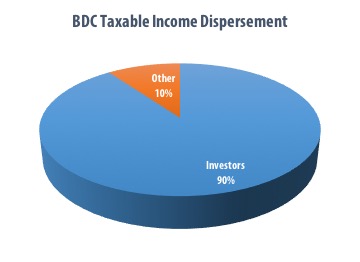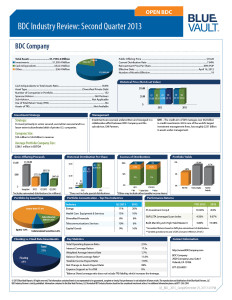A business development company (BDC) is an SEC-registered investment company that invests in primarily private U.S.-based businesses. This form of company was created by Congress in 1980 as amendments to the Investment Company Act of 1940. BDCs are typically taxed as regulated investment companies (RICs). Similar to REITs, BDCs are required to distribute at least 90% of taxable income as dividends to investors, and the company itself pays little or no corporate income tax.
Although the regulation for BDCs was passed in 1980, the creation of these companies did not come until the late 1990s
 and early 2000s. Furthermore, they did not begin to gain popularity until Apollo Investment Corporation raised $930 million in three months in 2004. This ignited a stream of BDC IPOs over the years following. Still, the BDC industry remains relatively small when compared to mutual funds, REITs, and other investments. Total BDC assets in the traded and nontraded investments are estimated to be close to $45 billion.
and early 2000s. Furthermore, they did not begin to gain popularity until Apollo Investment Corporation raised $930 million in three months in 2004. This ignited a stream of BDC IPOs over the years following. Still, the BDC industry remains relatively small when compared to mutual funds, REITs, and other investments. Total BDC assets in the traded and nontraded investments are estimated to be close to $45 billion.
Investments of BDCs
BDCs invest in primarily private companies. They are required to invest 70% or more of their assets in U.S.-based private companies. This is an investment type that was previously limited to institutional and wealthy individuals through private equity and private debt funds. Now through these SEC reporting funds, retail investors now have access to private equity and debt investments.
Many times, BDCs will invest in smaller or medium-sized businesses. BDCs may be diversified in the industries they invest in or have a specific industry specialization (i.e., energy, technology, healthcare). Additionally, they may focus on equity investments in companies, debt investments in companies, or a hybrid of the two. BDCs utilize management teams and advisors to underwrite investments and make loans or equity investments into companies. So far, nontraded BDCs have primarily been focused on investing in the debt side of businesses.
Additionally, BDCs are required to offer operational or management assistance to the companies they invest in. This provides a layer of support that the companies would not have previously had. Many times the managers of BDCs are very experienced at improving companies’ operations and profitability.
Traded and Nontraded BDCs

Historically, BDCs have been traded on public exchanges. Mirroring what happened about a decade ago in the REIT industry, nontraded BDCs have become available in the past few years. The first nontraded BDC, FS Investment Corporation, became effective in January 2009. Another nontraded BDC did not become effective until 2011 with Corporate Capital Trust.
There are a few reasons that the nontraded structure has come about. One such reason is that it allows the BDC to raise capital continuously. There are two parts to this. It allows the BDC to have capital across economic cycles rather than when the capital markets are up. Also, the continuous capital raise allows time for underwriting and investing in assets, rather than having to deploy a very large amount of capital immediately. Another reason is that the liquidity restrictions allow the BDC to be long-term focused. Additionally, the value of the investor’s investment is based on Net Asset Value (NAV) of the assets and is not subject to the same volatility and pricing as the stock market. However, these investments are not for all investors. They cannot be bought and sold on the public markets and have limited liquidity provisions. Typically the investor will have to wait five to 10 years until a “liquidity event,” sale of the portfolio, or listing on an exchange takes place.
External and Internal Management
Similar to REITs, BDCs can be externally or internally managed. External management is a structure where an advisor makes investments and manages the portfolio for the BDC. The BDC itself has no employees but pays a management fee to the advisor. Internal management means that the BDC has employees and overhead that are a normal operating expense to the BDC. However, most BDCs traded and nontraded are externally managed. The reason for this is that many BDCs are advised or sub-advised by experienced private equity or investment management companies. This allows those investment companies to use resources from across their organization to underwrite, manage, and handle the administration of the BDC.











